Editorial
I would like to begin this editorial with an apology. When we sent out the last edition of Don Bosco Today, we included a copy of the Don Bosco Calendar for 2003. It seems that some readers did not receive either. Although we have made numerous enquiries, we do not know why this has happened. Unfortunately they have all been distributed, and at this late stage we are not able to replace them. This year we will try to send them out in September to avoid the Christmas rush.We normally only make an appeal for donations in October. As you can see from our articles on the missions, how desperately our Salesian missionaries need resources to bring children off the streets and feed, clothe and educate them.
You will have noticed that in the last few years we have often mentioned our publications. We have published 11 new titles in the last three years. I am becoming more and more convinced of the importance of good books. Don Bosco was a great writer, a great publisher, a great believer in spreading the good news of the Gospel through books. We live in a world of mass communication, millions of pages of the printed word. So much of it is bad news. We, as Christians, are blessed with the 'Good News' yet we keep so quiet about it. There is always the danger of being apologetic about the gospel or being afraid to shout it from the rooftops. In the last few years, since we have published our books, I have seen the good they can do, become aware of the need they answer. Giving a good book, to someone who will benefit from it, is a way of preaching the gospel. Our Salesian schools give school-leavers a copy of 'Trust the Road' as a farewell present, a kind of vade mecum. We have found that Christian bookshops welcome our books. On page 19 you will see the list of books we have published, why not spread the good news by giving one of these books as a present. There is a book here for everyone, your chance to spread the good news.
The article on page six reminds us how children are affected by civil disturbance. If there is war so many children suffer. Let's continue to pray and work for peace.
Fr Anthony Bailey SDB (Editor)
Email: a.bailey@salesians.org.uk
Living on the Street
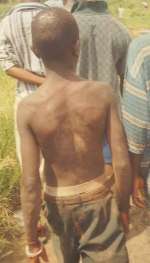 Street boys and girls are now a permanent feature of the city of Monrovia, our capital. Social workers tell me that nobody, not even Don Bosco Homes or UNICEF knows the exact number of street children in Monrovia. But who is a street child and why are there so many of them in major Liberian towns?
Street boys and girls are now a permanent feature of the city of Monrovia, our capital. Social workers tell me that nobody, not even Don Bosco Homes or UNICEF knows the exact number of street children in Monrovia. But who is a street child and why are there so many of them in major Liberian towns?Who is a street child?
According to Welleh Bohlen, a Community Outreach Supervisor working for Don Bosco Homes, a street child is someone who is under 18 years of age, living and/or working on the streets. Living on the streets implies that a child is under self-supervision, and does not return home at night for shelter. Working on the streets means a child is under some parental supervision, and returns home after working hours. Such a child helps supplement the parents' income to sustain the family. Another DBH social worker, Michael Wilson, offers this definition:
'A street child is a child whose life depends fully on what he or she can get from the streets.'
Why are there so many street children?
There is no simple answer to this question. Our social workers say it remains a difficult puzzle for them. The answers vary from child to child. The reason for the prevalence of street children boils down to the ever difficult economic situation Liberians have encountered for more than ten years now. There are so many factors responsible for driving children onto the streets. The main ones are, broken families, the lack of basic social services, step-parenting, peer-group pressure, parental neglect or abandonment, after-effects of the civil war, and domestic violence against children. In addition to these reasons, many children take to the streets simply because they do not want to be under parental control. Some of them just want to be free as the birds, taking off and landing at will. They don't want to go to school, they don't want to listen to their parents.
The Perils of Street Life
The dangers of street life are said to have reached an all-time high for street children. While they live and survive on the streets, street children don't always play it safe, and too often many of them run into trouble with the law, market traders looking for stolen items, security officers who are suspicious of them. They are sometimes exploited by unscrupulous adults. They pass their time watching violent movies. They are easily recruited to fight in the ongoing war. Worst still, a street child might die from malaria, tetanus, or even acquire the deadly HIV/AIDS.
The dangers of street life are seemingly endless. Joe Wiah, a social worker, with Don Bosco Homes told me, "Street children have little or no protection. One day, I was visiting the Water Side Market, when I saw a policeman whipping a little boy who was trying to find food at a cookery shop. I asked the officer why he was beating the boy, and the reason he gave was because the boy was a street child." Street children can easily be knocked down by vehicles or a violent mob, they live exposed to criminal activities, and premature involvement in adult-related activities. Sexual exploitation, poor diet, physical abuse, as well as being dehumanized are some of the risky outcomes of street life.
But what about the street children themselves: are they aware of the danger of being on the streets? David, a street child who sleeps at one of our night shelters, admits there are dangers in street life, "Sometime I can sleep under the market building, but people come beat me up, and nobody will defend me." Mark, who is 13, took to the street three months ago after he had knocked somebody down with his bicycle. Afraid of being punished, he fled from home and now sleeps at the DBH West Point Night Shelter until he feels he can face his family. The only danger he sees is street life itself where, "Anything can happen to me anytime". George, 14, agrees that the streets are not too safe, "Me and my friend were just walking along when the militia car comes and the soldiers say, 'Get on board, get on board' and they carried us off to Bopolu. I was given a gun. When I got wounded in the thigh I ended up in hospital in Ivory Coast." He is back from the Ivory Coast but he is still too frightened to return to his parents in town.
Is there a Future for Street Children?
According to our social workers, there is a brighter future now for street children. But this future is everybody's responsibility, it relies on the support of the Governments, the parents and the children's relatives. Creating a future for street children depends heavily on the provision of a conducive environment in which the children can develop into the productive adults of tomorrow. It depends on the provision of employment for parents so that they can be in the position to cater fully for their children. Another important element is the standardization of institutions of learning. Finally we need to rid ourselves of the gun culture, and give Liberian children, hailing from war-torn Lofa or Gbapolu County and elsewhere, the chance to go to school.
Are there benefits of Street Life?
Don Bosco Homes is a family where no child is ever viewed as a bad person no matter his or her track record. Hence, if a child does eight bad things and also does two good things, people in Don Bosco Homes concentrate on the few good deeds of that child to change him or her. Some of our social workers claim that there are some positive aspects of street life. Street children have potential, they have learned to survive. Sometimes their survival instincts are greater than most children who don't live on their own. A typical street child, in many instances, independently develops many skills, and is more aware of danger. If we can get this children off the streets, these skills can be further developed for the good of society. Street children learn to work in a team, especially in times of difficulty. They often work together, not only in defending a weaker friend, but also in finding medication for sick companions, or in finding lodgings. They have learnt the secrets of surviving on the streets. Many street children find their way to our reception centres through their friends. They inform us of their predicament and intervene for them to get them released from police custody.
The prevalence of street children seems to be a permanent problem for Liberia. While it might be difficult or even impossible to completely do away with them, many people, working with them, think that the number of children taking to the streets can be minimized. The starting point is family empowerment. As long as family empowerment remains a far-fetched notion, street children will continue to be an omnipresent feature of our big towns.
By John T. Monibah
Monrovia
Making Ends Meet
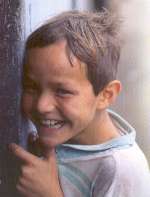 The 24 boys who live in the Domingo Savio Children's Home in the east of Caracas are having pasta for dinner tonight. Pasta with tomato ketchup. The home's helpers look on sadly, but the kitchen shelves are bare and there is no money to buy anything more. "Spaghetti with ketchup again! It's not exactly recommended by any of the nutritional guides," the home's co-director, Yasneida Meléndez, laments. "The boys are fantastic, though. They understand and never complain. What else can we do when there isn't any money for anything?"
The 24 boys who live in the Domingo Savio Children's Home in the east of Caracas are having pasta for dinner tonight. Pasta with tomato ketchup. The home's helpers look on sadly, but the kitchen shelves are bare and there is no money to buy anything more. "Spaghetti with ketchup again! It's not exactly recommended by any of the nutritional guides," the home's co-director, Yasneida Meléndez, laments. "The boys are fantastic, though. They understand and never complain. What else can we do when there isn't any money for anything?"Venezuela is currently suffering the disastrous aftermath of a two-month general strike, called by opponents of leftist President Hugo Chávez, in support of their demand for fresh elections. The consequent economic slump in the oil-rich country has hit the Salesian network of children's homes particularly hard because they depend greatly on the generosity of private companies and individuals, all of whom are in dire financial straits. The Salesian network plays a crucial role in Venezuela, where there is virtually no state provision for children in need, but the recession has forced homes to slash budgets, even as food prices spiral upwards. With no end in sight to the difficult current situation, the Salesian homes are facing their worst crisis in living memory.
Yasneida and her husband Iván, who manage the Domingo Savio, need every penny they receive to buy food and pay helpers. At the moment, though, a shortage of donors means the home's monthly income has fallen dramatically. At the same time, the price of a kilo of flour has risen almost 60% since early December, while the cost of other basic foodstuffs has also risen dramatically. "I'm so worried I can't sleep at night," Iván Meléndez says. "Before, people used to give and give. Now they ring and say they haven't got anything themselves." The director of the network of homes, Fr Rino Bergamin, agrees that this is the worst crisis he can remember since he swapped his native Italy for Venezuela 51 years ago. "The effects of the strike are making themselves felt and they are massive," he says. "Our homes are facing serious difficulties at the very time when levels of critical poverty are increasing and there are more children than ever needing our help."
Venezuela's economic crisis stems largely from the ongoing political conflict between supporters and opponents of President Chávez, an outspoken former paratrooper, who was elected with a huge majority in 1998 after pledging to introduce radical social reforms. One of Mr Chávez's most famous campaign pledges was that he would ensure that no child in Venezuela would have to sleep rough on the streets. But after more than four years of his government, Fr Rino said there has been little improvement in state provision for children in need. "He used to call street children the children of the fatherland, so one of our options is to hold a giant protest and take all of our children to see the president and then say, 'Here you are, here are your children, now you look after them'." He mischievously suggests.
There are still no short-term shelters for children in the entire municipality of Sucre, a populous district that takes in much of east of Caracas. If a child is deemed to be in danger or is found alone in the streets late at night, there is literally nowhere for the police to take him or her, except to one of the homes operated by religious orders. This creates serious problems for the homes themselves, which set out to provide stable medium and long-term care rather than short-term solutions. Fr Rino laments that the Salesian homes receive no government funding, but provide the majority of emergency shelters for Venezuela's children.
Domingo Savio normally receives children between seven and 12 years of age. Many are orphans; some were found abandoned in the street, while others were given up by parents because financial or psychological problems were preventing them from providing a stable home environment. Before they reach Domingo Savio, those children, rescued from the streets spend several months at a halfway house, where they learn the basics like using a knife and fork or sleeping in a bed. The children also receive intensive psychological counselling to help them deal with their frequently traumatic lives.
At the age of 12, the boys transfer to the Salesians' teenage centre in the city of Valencia, two hours from Caracas. The Valencia home houses 200 boys aged between 12 and 16, who are taught practical skills and how to use computers. The idea is that every boy leaves the Salesian system with a trade, such as plumbing or carpentry, which will allow him to make a living.
The network's directors aim to teach strong Christian ethics, but through their example and by lively discussion rather than by obligation. "Why would Jesus do that? Why did people respond in that way?" Iván Meléndez asks after evening prayers, and immediately a forest of hands shoots up and a debate ensues. The home also works hard to integrate the boys into their local community and to emphasise that Domingo Savio is a base for them rather than a barred-gate institution. The boys all study at local schools and many have 'godparents', local families who look after them at weekends and provide them with a surrogate home.
The support of the local community, and its awareness of the work the homes do, are likely to be crucial in the difficult months ahead. International aid is certainly unlikely. Even despite the current crisis, Venezuela remains relatively well off compared to several other Latin American countries, and tends to be ignored by international donor institutions.
 Iván Meléndez is now planning to take advantage of community goodwill by knocking on the doors of nearby apartment blocks to ask each family to contribute 1,000 bolivares, around 36 pence, to the home every week. "It's not much, but it could make all the difference to us," the home's co-director says. "We have to keep lobbying and fighting for the work we do here. Don Bosco taught us that our work was more important than any budget, and we have to keep going no matter what."
Iván Meléndez is now planning to take advantage of community goodwill by knocking on the doors of nearby apartment blocks to ask each family to contribute 1,000 bolivares, around 36 pence, to the home every week. "It's not much, but it could make all the difference to us," the home's co-director says. "We have to keep lobbying and fighting for the work we do here. Don Bosco taught us that our work was more important than any budget, and we have to keep going no matter what."Owain Johnson
Freelance journalist based in Caracas, Venezuela.
THE SLOW WAY OF A VOCATION
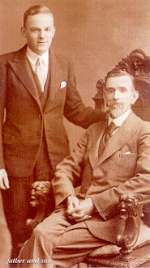 Since life starts with our parents let me say at once that, directly, they had no part in the onset of my vocation to the priesthood. Indirectly, of course, they had everything to do with it. My mother, from a Scottish father proud of the family's penal time survival, died when I was five in 1913. After three years my father, pensioned off from the army, married the nurse who had greatly cared for him in the military hospital. She was of Polish extraction and shared his staunch faith.
Since life starts with our parents let me say at once that, directly, they had no part in the onset of my vocation to the priesthood. Indirectly, of course, they had everything to do with it. My mother, from a Scottish father proud of the family's penal time survival, died when I was five in 1913. After three years my father, pensioned off from the army, married the nurse who had greatly cared for him in the military hospital. She was of Polish extraction and shared his staunch faith.I would say that my father was a militant Catholic. His mother was a Houghton of strong recusant stock, so that when my sister Christine was professed as a religious Sister, a 'Helper of the Holy Souls', it was at his insistence that she took the name of the martyr Blessed John Houghton. My father was widely read in Catholic History and particularly that of Lancashire penal times. He instilled into all of us, especially into me, an active militancy as proud and staunch as his own.
His health, however, was ever precarious and, when I was thirteen, medical advisors suggested he move to the somewhat invigorating climate of Alderney. Unfortunately, the only Catholic school on the island was of a very elementary standard so we could receive no secondary education at all. However, because of the home environment, the educational background of both parents, I could make some claim to be home taught and indeed when I joined the Salesians in Oxford I found little difficulty, apart from one or two specialist subjects, in coping with the programme.
However, when I was about eighteen and seeing that there was absolutely no future in Alderney, I went to live with an uncle and aunt in Lancashire. There had always been in the family the vague suggestion of a vocation. Every good Catholic family could look for a priest or nun from the children. Since I was the only boy in the first family they looked to me. But I did not respond and allowed more years to go by. We moved into 1928 and I was twenty.
I was working at a large engineering works in Gorton, Manchester. Next to the factory there was a Franciscan Friary. During the dinner hour I would occasionally drop in for a visit as did others from the works, notably a middle-aged man who attracted my attention. In the church I found mention of the Franciscan Third Order and eventually decided to apply for entry. There I was intrigued to find that the Lay Novice Master was the man I had noticed, a foreman at the works. So the first seeds of my vocation were sown and begun to sprout. I was advised to consult the parish priest.
His predecessor had been a typical dear old Canon. The streets were lined by all and sundry at his funeral. The present man was a Doctor, an intellectual, not at all inclined to waste his time with uncertain young men with few prospects.
"What makes you think that you could be a priest?"
"Well I don't know if I have a vocation, but well, my sister is a nun. . ."
That was fatal!
"Oh, a nun's vocation! Dear, dear! Listen young man, go away and think again. In a couple of weeks, you'll have forgotten all about it..." And that was that, no help there.
My stepmother who had been educated at what she claimed to be the 'best girls' school in Scotland' spoke now and then of their Jesuit chaplain, a Father Lester. So when I heard that he had opened a house for late vacations at Osterley, I decided to write to him. He replied at once saying he had no vacancies, but suggested I apply to the Salesians at Battersea.
I used the address he gave me and wrote for information. After some delay I was told to provide certain papers, testimonials, birth, baptismal and confirmation certificates. The family had moved around a good deal and the gathering took some time. Eventually I sent off the papers. They were not acknowledged and we moved into 1929.
In the spring I wrote to remind them of my existence, but with no better result. Another attempt in mid-year this time brought a reply from the provincial secretary, thanking me for my two letters. He explained that the delay was because Father Provincial had had to go to Italy for the Beatification of Don Bosco. But he could see no reason why my application should not go forward. He left it at that, with no instructions as to what to do, where to go and when! More delay and now September.
Now I had had enough. I wrote this time to say that I felt they were no longer interested and would they kindly return my papers so that I could apply elsewhere. This time the provincial secretary moved and instructed me to go to a place called Pott Shrigley, near Stockport, and there to see a Father Franco. When I finally got there I was in no suppliant mood. I had been messed about for a whole year by incompetent delays. Father Franco, of course, knew nothing of all this and his opening remarks did not help.
"It is very late in the year now; you should have applied before; the students have already been here a month". What! Too late, after all I had been through!
This, understandably enough, set me off in a fury and I forthwith demanded the return of all my papers.
"And so what will you do now?" He asked.
"I don't know, probably apply to the Franciscans, but never again to the Salesians".
"Oh well, in that case, you had better go down to our House at Cowley for the late vocation students". Typical Father Franco. He had been playing with me a little. And so the following week, I went to Cowley, Oxford. I knocked on the door of my first Salesian house, seventy four years ago.
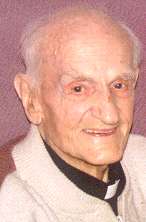 As for my Father, whom I had not kept informed of my moves, his reaction was predictable. "What! Joined the Salesians? Who are these Italians no-one has ever heard of? Why didn't you join the Jesuits?" His school was with the Jesuits at Preston and he had a fierce loyalty to them. As a child, my party piece was to recite his laudatory 'The Bells of St Ignatius.' I am afraid, dear Dad, that as you were unable to afford me the means of attaining to a recognised educational level, your Jesuits would not have had me. Ignatius, great indeed, but Don Bosco was satisfied with less.
As for my Father, whom I had not kept informed of my moves, his reaction was predictable. "What! Joined the Salesians? Who are these Italians no-one has ever heard of? Why didn't you join the Jesuits?" His school was with the Jesuits at Preston and he had a fierce loyalty to them. As a child, my party piece was to recite his laudatory 'The Bells of St Ignatius.' I am afraid, dear Dad, that as you were unable to afford me the means of attaining to a recognised educational level, your Jesuits would not have had me. Ignatius, great indeed, but Don Bosco was satisfied with less.Fr W A Ainsworth SDB
REFLECTION
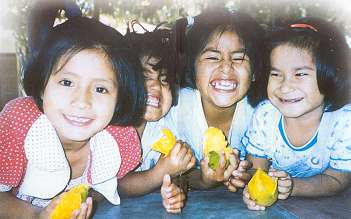
By kindness feed the smile in them.
Food for the body, love for the soul,
Through us, O Lord, Thy blessing send.
A Tale of Two Parishes
 St Benedict's Church is what the architects call a distressed building. It has caused the parishioners a great deal of distress too. In the last three years, I have been to meetings with architects, surveyors, Heritage Lottery, Historic Scotland, and Greater Easterhouse Development Company, and still, although a great deal of work has been done, the parishioners wait to hear when the work will start on the refurbishing of their church. Not far up the road, is another huge church building, St Clare's. Like St Benedict's, it was built for a different time with a different agenda. There is no space for people to gather socially, no space for youth groups, elderly groups, prayer groups etc... those things that help to build community.
St Benedict's Church is what the architects call a distressed building. It has caused the parishioners a great deal of distress too. In the last three years, I have been to meetings with architects, surveyors, Heritage Lottery, Historic Scotland, and Greater Easterhouse Development Company, and still, although a great deal of work has been done, the parishioners wait to hear when the work will start on the refurbishing of their church. Not far up the road, is another huge church building, St Clare's. Like St Benedict's, it was built for a different time with a different agenda. There is no space for people to gather socially, no space for youth groups, elderly groups, prayer groups etc... those things that help to build community. Church buildings, in need of major repair or re-organisation, can easily become the overriding preoccupation of a parish priest. In Easterhouse that hasn't happened, because of the way we have organised our ministry. We are focussed on a different agenda. While we await the rebuilding of our churches, we press on with the re-building of our parish communities. The responsibility for pushing that agenda has been a shared one: a group of committed laity, sisters and priests is leading the two parishes into the 21st Century.
A TEAM APPROACH
The foundations were laid in early 1996, when the religious already present in the East End of Easterhouse agreed to work together as one team. At the same time they made a commitment to create new structures in the two parishes, to bring about a growth of leadership and a sharing of power with the parishioners.
Through our commitment to parish duties, through our outreach work, by working within the structures of the church and the area, we hope to contribute to the transformation and growth of the local community, and the building of the Kingdom. (Our Vision Statement)
Bishop Devine blessed the proposals and in September 1996 the Diocese entrusted the care of the two parishes to what is called the Joint Pastoral Team. Now, after six years, only two of the original founding members remain, but the three religious orders, Daughters of Charity, Salesian Sisters and Salesians of Don Bosco, are still committed to the Project. In June 2001 the provincials extended the six-year commitment for another two years, with the possibility of further extension.
GETTING STARTED
We began with a series of meetings in each parish. A chance for people to come together to talk. What do you like about your parish? What are your hopes? What are your fears? What kind of parish do we want to be? These meetings were also an opportunity to think about the bigger picture. What impact are the parishes having on life in Easterhouse? What is happening in the Diocese, and how will that affect the parishes?
Our reflections brought made us realise that changes were already happening. More would inevitably come. How best to deal with them? Wait for decisions of others to be handed down, or prepare ourselves to take a part in shaping those decisions? We opted for the latter.
ONWARDS AND UPWARDS
We've had a rollercoaster ride: inviting, cajoling, and helping people to take up new roles, new ministries, sharing responsibility and encouraging each another into leadership. Three years into the Project, each parish was able to commission its own Pastoral Planning Team. Three years on, people are getting used to the idea of a parish leadership that is no longer the parish priest. It is now a shared leadership, laity, sisters and priests together; church as communion. Each year, parishioners have put forward their nominations for new parish team members. The Pastoral Planning Teams have reflected and prayed before deciding who to invite into leadership. Other groups have also grown up in each parish: to pray, to care for the bereaved, to minister to the sick and housebound, to provide youth activities and summer plays-schemes. In each parish finance committees were needed to oversee income and expenditure. It's hard work, but when we take time out to evaluate and reflect we can see how things are growing.
EVALUATION
What difference has the Team approach made and what have we learned?
1. The parishes have enjoyed the riches of the Salesian and Vincentian charisms. They are a good match and have helped to shape a vision which is both challenging and down-to-earth.
2. Things are now prepared and planned for, and afterwards evaluated. Each September, the Joint Pastoral Team comes together to plan ahead. Throughout the year, further planning and reflection meetings take place. The Parish Pastoral Planning Teams also meet regularly to pray and plan. Each June, all three teams meet with Diocesan representatives and Provincials to review the year, and celebrate our successes and failures. An open assembly takes place in each parish once or twice a year, so parishioners can be actively involved in preparing for the future. The Parish Planning Teams pick up the issues arising at those assemblies. Most recently, each parish team produced a two-year Pastoral Plan, drawing on its own end-of-year evaluation and other ideas generated at recent diocesan and parish assemblies.
Some people are feel that PLANNING kills spontaneity and initiative, no room for Divine Providence. That's not our experience. Planning takes up a lot of time and can be slow, but it brings lots of benefits, not least because it means that more people are involved and in the know, and there is a greater sense of ownership. With all our planning, there's still plenty of room for spontaneous events and for God to come to our help, which He frequently does.
3. We are much clearer about ROLES and TASKS. This is because we have had to spend time on role clarification. We now understand that the commitment that one person is able to give will differ from another's. A full-time sister will take up a different role from a parishioner who has other family and work commitments. Role clarification has meant that our expectations of people have become more realistic. It was also a help in dealing with the feelings that accompany change. For true empowerment of lay people to take place, clergy and sisters need to share, or even surrender some of the powers that they have taken to themselves over the years. Our evaluation days have provided the opportunity, for those taking on responsibility and those letting go, to talk about how it all feels. Having said all that, the commitment of many of the parishioners has been nothing short of amazing.
4. Our Joint Pastoral Project has given us a better understanding of how DELEGATION works. It's more complicated than allowing people to do things. With the delegation of every task comes a delegation of authority. It is important to publicise when authority is being given or taken up. We have sought to commission people into ministry, into leadership, with the approval of the parishioners. This makes it easier for people to take up their new roles. Nobody can do everything, and many things can be delegated, but other people may do things in a different way, even mess things up. However, with patience and goodwill there are few situations that can't be handled. It does happen that doing something differently produces an improvement!
5. We've learned that the best way to help people into leadership and ministry is by DISCERNMENT and PERSONAL INVITATION. General invitations, 'We're looking for volunteers to...' do not work. Scripture offers us the model of the apostles, who first gathered in prayer, then made their choice of Matthias (Acts 1:21-26). We've also learned that it's better the same people don't do everything. That makes for hard work, searching carefully among the people of the parish and having the brass neck not to take 'No' for a first answer. Perseverance is needed, and a willingness to wait for people. You often get the reaction: "Who? Me? You cannot be serious!" That first invitation, and the second, and the third, can make people think and can do wonders for their self esteem. In time I would hope many people will find the unique contribution they can make to their parish.
6. We learned not to ask anyone to do something without also undertaking to walk with them as they learn how to do it. TRAINING is essential, if people are to take up new leadership and responsibility with confidence. Our experience has identified a number of different levels of training. There's the practical how to kind of training, but I would suggest that more important is the training that attends to people's spiritual development and understanding, because it is faith-filled leadership that is needed. It's important to find the right kind of training, delivered in the right way. We have come to the conclusion that the training that suits us best is short modular units: maybe four or five evenings or a one-day Saturday workshop. That's enough spread over a term. Multiply that by three and you have a year's training input. It's been quite hard to find that kind of provision, but we have managed to find something.
We were fortunate to find a good resource near to home: the Craighead Institute. They were willing to come out to the edge of the city and work with us. Firstly a course in Social and Pastoral Ministry. The next year, a similar course on Faith and Life. After that, a short course on Bereavement, which resulted in the formation of a Bereavement Support Group. Our Diocesan Pastoral Centre offered four evenings on Liturgy. We lapped it up.
This year we have tapped into the National Seminary. One member of staff has provided us with a module on A Spirituality of Communion, another will shortly present a module on Our Understanding of Church. In the summer term we are going to explore Personality Types and Teamwork with another member of staff.
Training costs money, but we've successfully applied for funding to various trusts. The Columba Trust and the Church of Scotland Priority Areas Fund have come to our assistance.
IN CONCLUSION
Is the Team approach worth all the time and effort? As a committed enthusiast, I can only say a very definite Yes. In our good moments, I think all the members of our teams can see progress, celebrate successes and achievements, and appreciate the strength and richness that a Team approach brings. But it's not easy. Effecting change in a formidable institution like the Church stirs up a lot of emotions. Sometimes the weight of the institutional church can press heavily. It's better if we don't deny the pain involved. Better to take the lid off things than to expend a lot of energy just keeping it on. You learn to appreciate support. Others are grappling with the same issues.
I don't think this is the kind of Project where you ever reach the stage of saying the job's done. It's ongoing, and it can be hard when you have invested a lot of time and training on someone only for them to move away to another parish. That's when we have to be less parochial and learn to celebrate someone's growth and development and know that they are taking what they have received to the wider church and world.
It would be nice if you could control the pace of change. That's often not within our power. Too much too soon becomes another problem. One day our Diocese will no longer have a priest resident in each parish. How much time have we got? Not a lot, if we are to avoid a situation where massive change is going to be forced upon us very rapidly.
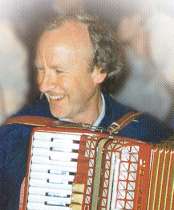 The biggest issue currently for me is around Authority and Power. New roles are emerging and developing. The Church needs to think about how to authorise these roles and empower lay people to take them up. It's good that people are finding the confidence to take up their own authority. It's good that parishioners are willing to confer authority from below on fellow parishioners, as they commission new members to their parish teams. Real authority also needs to be conferred from above. Faith-filled episcopal leadership and a statement of confidence in the laity are called for. If these are not forthcoming, then we may find we have wasted our time. So we press on with a sense of urgency. I'd like to think we do so with a degree of optimism. But we struggle from confusion to clarity, through the pain of loss to the joy of new birth. We need understanding and support, and maybe after six years we also have valuable experience which others might like to hear about.
The biggest issue currently for me is around Authority and Power. New roles are emerging and developing. The Church needs to think about how to authorise these roles and empower lay people to take them up. It's good that people are finding the confidence to take up their own authority. It's good that parishioners are willing to confer authority from below on fellow parishioners, as they commission new members to their parish teams. Real authority also needs to be conferred from above. Faith-filled episcopal leadership and a statement of confidence in the laity are called for. If these are not forthcoming, then we may find we have wasted our time. So we press on with a sense of urgency. I'd like to think we do so with a degree of optimism. But we struggle from confusion to clarity, through the pain of loss to the joy of new birth. We need understanding and support, and maybe after six years we also have valuable experience which others might like to hear about. I began with our distressed buildings and distressed parishioners. Six years down the line of our Joint Pastoral Project, maybe we're nearer the day when the distress factor is something we can handle, because we have grown so much.
Jim McGarry SDB
Don Bosco, Family and World
For every member of the Salesian Family the feast of Don Bosco, on the last day of January, is an opportunity for rejoicing and giving thanks to God for the gift of Don Bosco and the Salesian charism. This year the celebration of the feast, in my community in Bolton, involved me in some familiar traditional features and some new experiences.We began on the evening before the feast by inviting the members of our school management team for a meal with the SDB community in our community house at Thornleigh. With a staff in excess of 100 it was impossible to invite them all to a meal, but we had managed a buffet for all the staff at the end of the Christmas term.
On the day itself several Masses were celebrated with creative input from the youngsters. After Mass all the students were taken out for the day on some form of activity ranging from ice-skating, paint-balling, cinema, bowling, golfing and so on. The number of our students exceeds 1600 plus all the members of staff, an amazing organisational achievement and a great way to mark the day as something special. In the increasingly intense and test-based culture of modern education such days have greater value than ever.
I experienced the joy of celebrating Don Bosco's Mass with the elderly and retired members of our Bolton Salesian community. These are men who have given many years of their lives to the Salesian mission and who now continue a rich apostolate of prayer. At the end of the feast day weekend I also celebrated Mass for the past-pupils of Thornleigh and Shrigley in our school chapel.
So much for the traditional activities, but I want to mention a couple of other things I was involved in that weekend. For some time now I have been a member of the Bolton Inter-Faith Council. Like many towns today Bolton has a rich mix of faiths, Christian, Muslim and Hindu. For some weeks now the Muslim community, in particular, has been concerned about increasing tension in the world and the growing threat of war. In recent years there have been disturbing race riots in some of our northern towns and nationally the right wing tabloid press has been whipping up a lot of hostility to asylum seekers. At the same time the British National Party has begun to win seats in some local elections.
Our Inter-Faith Council is very anxious to maintain good relations between the different faith groups in our area. To highlight this concern we invited our local Member of Parliament, Mr David Crausby, to attend a public meeting in Bolton Public Library at which speakers from each of the faiths would outline their concerns about the consequences of a war with Iraq. The meeting took place on the 31st of January, so on the night of Don Bosco's feast Fr Tony Bailey and myself sat down with fellow Christians of several denominations, and our Muslim and Hindu brothers and sisters to participate in the debate. The next day I attended a prayer vigil in the Unitarian Chapel to pray for peace.
We all know how much Don Bosco emphasised the idea of 'Family'. The Salesian Family and the family spirit are all familiar phrases in the Salesian Charism. Don Bosco lived in times very different from our own. A lot of his work took place in the context of strained and difficult relations between Catholics and Protestants in 19th Century Europe. Today much of that inter-Christian hostility has fortunately been put behind us. But we face a new and challenging problem. How do we relate to the new presence of other faiths at a time when religious fundamentalism is on the increase? Because much of this terrorism is attributed to Islamic militancy, how does that effect our relations with our Muslim neighbours? Can we distinguish between fanatics who have hijacked and distorted Islam for their own destructive purposes and the ordinary peace-loving followers of this great faith? The popular press paints with a broad brush, and delights in damaging generalisations. As a Muslim friend of mine said to me recently, "Why is it that every time you see the word Muslim in the press it is nearly always linked with 'terrorist'. I know you are a Catholic priest but I'm not going to call you a paedophile".
During the weekend of Don Bosco's feast this year I began to reflect on how we, as members of the Salesian Family, can respond to these kind of issues. Our new Rector Major, Fr Chavez, has asked us to strive during 2003 to make every family and every community a home and school of communion. Throughout human history religion seems to have been a source of dissension, argument and even violence. Many atheists and agnostics throw this criticism at us believers; and we have to admit and own our past sins in this regard. But I am convinced that, as religious faith and practice appears to be in numerical decline in the West, we have a new opportunity to open ourselves to God's vision and plan for the whole of our human family.
Put simply, healthy religion or spirituality should help us to live and move freely in and out of three levels of meaning.
1. The first is My Story. So much emphasis today is placed on the individual. This is my story, the level of my feelings, my ideas, my rights. Many of our parents and grandparents never got the opportunity to use this kind of language. Nor did many people in traditional religious life. The negative side of this is that we can all too easily get trapped in a very narrow horizon of individualism. Listen to talk-radio programmes, watch TV shows, in which individuals cry out with their private pain. It is all about ME, my views, my emotions; without any sense of my life being part of a much bigger picture. There is nowhere to take my pain other then the desire to find a scapegoat or to sue someone and seek financial compensation for the pain of life.
2. The second level is Our Story. This is a much wider level of meaning and includes our family, our group, our community, our nation, our football team, our club, our school, our favourite band, our Salesian Family. Such a wider community is vital in our growth and sense of identity. It provides healthy space for love, loyalty, celebration, trust and a real sense of belonging and pride. However, this level can all to easily leave us trapped in a comfort zone and even more dangerously, lead us to over-identify with Our Story to such an extent that we think that we appropriate God to our side. It can make us feel that we always are right, after all we are 'the chosen people'. As a result 'the others' must be wrong. Most of humanity's wars and acts of inter-group violence operate at this level.
3. The third level is The Story. This is the story of humanity, one that includes everyone. This is the dream of the kingdom of God. This is why God became incarnate to invite us always to broaden our horizons and to exclude nobody. This involves seeing the goodness and wisdom in other faiths while deeply living our own faith story. As we move into the twenty first century I am convinced that the Spirit of God is inviting us to live at all these three levels and I feel sure that Don Bosco, with his global vision, would invite us to share this dream.
Michael Cunningham SDB
Within & Without by Michael Cunningham
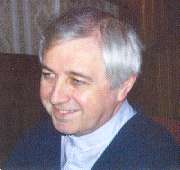 Judged by external criteria religious life in the western world appears to be in decline. Few if any candidates are joining, the age profile continues to increase, houses are being closed and religious are handing over positions of responsibility to the laity. We are living through a period of numerical decline and some have even questioned whether religious life itself can survive.
Judged by external criteria religious life in the western world appears to be in decline. Few if any candidates are joining, the age profile continues to increase, houses are being closed and religious are handing over positions of responsibility to the laity. We are living through a period of numerical decline and some have even questioned whether religious life itself can survive. Fr Michael Cunningham is an optimist. He believes that the Holy Spirit is at the root of this crisis. He sees all spirituality expressed through the paschal mystery, the rhythm of life and death which is the only pattern left to us by Jesus. He argues that the crisis in religious life today is just another form of the deeper crisis affecting our postmodern world which has lost the sacred pattern of meaning. His own journey as a salesian teaching in a comprehensive school, then bearing the burden of provincial leadership, has led him to the awareness that God is present in all aspects of our human experience, good and bad. He explains how by accepting ourselves, and learning to love others, we are drawn into a love of the enchanted yet flawed world in which we live. Though this book is primarily for Religious, it will help all of us make sense of the challenges facing us today. Michael is a reluctant author, it was not easy to persuade him to write this book. I'm glad I did.
Tony Bailey
The Vocation of an Author
At the age of 52, after various jobs and 8 years of study I discovered my vocation as a teacher. I had worked in a bank, in insurance, in a department store, and I had run the family business. I decided, with the encouragement of my husband and my sons, who were now at secondary school, to begin studying. After completing my degree in education. I decided to apply for a teaching post. A few weeks before I was due to take up this post my mother suffered a stroke, so I gave up all thought of teaching to care for her. Sadly she died on Christmas Day two and a half year's years later. I began teaching in a primary school the following Easter. I enjoyed every day of my nine years' teaching, always conscious of the immense importance of teaching on the life of young people. I retired from teaching with a heavy heart. After a varied working career I had saved the best till last. In teaching I had found my true vocation. Although I was enjoying an extremely happy retirement I felt deskilled, I still had so much more I wanted to give to the young. When I was asked by Don Bosco Publications to write children's books I saw it as an opportunity to fulfil this need. My first book 'Rosie goes to Church' was a storybook but it also needed to be informative. I had always been surprised how little some children knew about the church. What is a tabernacle? What are the Stations of the Cross? The popularity of the book confirmed its need. Within a year it had sold out and a reprint was ordered and it continues to sell well.My second book, the life of Saint John Bosco, was written because I had always felt the need for good books for children on the lives of the saints. What better saint than John Bosco! His story has always been inspirational for me; a teacher, a priest and a friend. What surprised me was the feedback I received from so many adults who were moved by the story.
During my years as a teacher I had always discussed the Sunday's gospel with the children on the previous Friday. That way I felt they might listen more attentively and understand the gospel message more clearly during Mass. One of the things that seemed to confuse children was hearing the story of Christ's birth and then a few month's later the story of the crucifixion. In my third book 'Good News in the Family' I tell the story of Jesus chronologically from the Annunciation to the coming of the Holy Spirit. As with 'Rosie' it is set within the context of a family and at the end of each chapter the parents discuss the events of Jesus' life and attempt to answer the children's questions. For me one of the most exciting things was to hear that this book together with 'Rosie' was being given as a baptismal present. What an unusual but lasting gift!
One cannot overestimate of the influence of the written word. Each title in the range of books published by Don Bosco Publications means so much to many people. I do hope that my contribution, which has fulfilled a need in me, will also help to develop within young people a better understanding of the Good News of the gospels.
Kathleen Pearce
SISTER CATHERINE PARKER 1915 - 2003
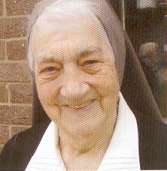 I had known Catherine since I was 11 years of age, and if I'm truthful she terrified the life out of me as a schoolgirl at Mary Help of Christians. Yet over the years we got to know each other, understand and love each other, and I discovered in her a woman who needed love and care, and a person who was able to give this as well. Catherine was the youngest of seven children, and became a Salesian Sister in 1939 and then spent the rest of her life in the education of young people, both as a primary and secondary school teacher. Catherine had a great love of music, and prepared many choirs over the years to take part in music festivals. She was always present, wherever there were children, and even up to July last year, she was working with the primary children, a grandmother figure, not only for the little ones but also for the young teachers in the school.
I had known Catherine since I was 11 years of age, and if I'm truthful she terrified the life out of me as a schoolgirl at Mary Help of Christians. Yet over the years we got to know each other, understand and love each other, and I discovered in her a woman who needed love and care, and a person who was able to give this as well. Catherine was the youngest of seven children, and became a Salesian Sister in 1939 and then spent the rest of her life in the education of young people, both as a primary and secondary school teacher. Catherine had a great love of music, and prepared many choirs over the years to take part in music festivals. She was always present, wherever there were children, and even up to July last year, she was working with the primary children, a grandmother figure, not only for the little ones but also for the young teachers in the school.Catherine had a great love for her sisters; she enjoyed community. When she was in hospital, the first question she asked was, "How is everyone at home?" And then she would show her concern for the people visiting her. "Have you eaten, have you got work to do?" She was aware of the gift of presence to her, and didn't take it for granted. Catherine had a great love of life and was always the first to participate in any outing that might be available. In August last year she enjoyed the opportunity of returning to our source in Mornese, and despite the rain enjoyed every moment of the trip. Catherine had a great sense of humour, and she always enjoyed a joke. This dry wit was with her throughout her last weeks in hospital. We all have our memories of Catherine no doubt a whole bag of mixed emotions. For me the best memory was her desire to change to become a better person, a desire that she spoke of many times in the last few weeks. I pray that whatever our memories of Catherine, we will accept her dream, to become the best version of ourselves that we can.
Sister Pauline Clark FMA
FR DECLAN COLLINS SDB 1952 - 2002
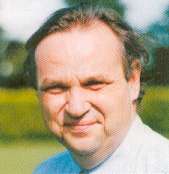 Born at Baltray Co. Louth, Declan was one of a family of four sons and two daughters. On completing his schooling in Clongowes Wood College, Declan worked for a number of years with Allied Irish Bank, before joining the Salesians in 1979. He did his initial training in Pallaskenry, Co. Limerick, at the Salesian Novitiate in Crumlin, Dublin and in Maynooth. He was ordained priest in 1990 and went to South Africa in February 1991. His work there was varied and challenging. He taught for a short while at the St John Bosco College at Daleside near Johannesburg, and then worked for several years with street children, first in Capetown and later in Manzini, Swaziland. He was involved in the distribution of the 'The Big Issue'. Just about a year ago, he took up his appointment at the Salesian parish at Ennerdale, an Indian township near Johannesburg, South Africa.
Born at Baltray Co. Louth, Declan was one of a family of four sons and two daughters. On completing his schooling in Clongowes Wood College, Declan worked for a number of years with Allied Irish Bank, before joining the Salesians in 1979. He did his initial training in Pallaskenry, Co. Limerick, at the Salesian Novitiate in Crumlin, Dublin and in Maynooth. He was ordained priest in 1990 and went to South Africa in February 1991. His work there was varied and challenging. He taught for a short while at the St John Bosco College at Daleside near Johannesburg, and then worked for several years with street children, first in Capetown and later in Manzini, Swaziland. He was involved in the distribution of the 'The Big Issue'. Just about a year ago, he took up his appointment at the Salesian parish at Ennerdale, an Indian township near Johannesburg, South Africa.On the Saturday night of the 16th November 2002 Fr Declan was putting the finishing touches to preparations for the opening and blessing of a new multi-purpose hall in his parish A short time later he was found dead by a colleague, Fr Matthew Agostinelli. He had suffered multiple wounds in what appears to have been an attempted robbery. Declan had a heart of gold. He will be remembered for his deep concern for young people in difficulty, a quality that was evident even in his days in the bank when he devoted much of his spare time to voluntary work in various youth clubs. Those who knew him speak also of his courage in difficult and challenging situations, his sense of humour and his exceptional generosity. In Declan we have lost a good priest and a generous missionary.
Fr Robert Gore SDB (Provincial, South Africa.)